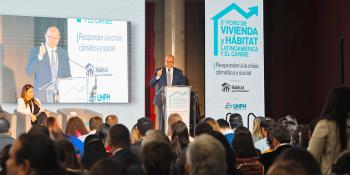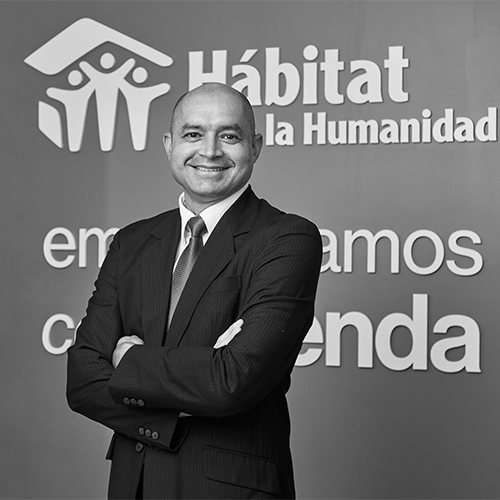
Message from LAC VP
Ernesto Castro-García. October 2023
October, 2023. Welcome! Thank you for your interest in Habitat for Humanity. In case you don’t know, we are a global non-governmental organization that seeks to achieve a world where every person has a decent place to live, because housing is a human right and all families deserve a safe, resilient and where they can build a better future.
Habitat for Humanity has more than 45 years of history and currently, we work in more than 70 countries around the world. Specifically in Latin America and the Caribbean, we have a presence in 17 countries, where low-income families find in Habitat for Humanity the perfect ally to build or improve their homes and thus, finally, have a safe home.
But our work does not stop there. In addition to building or improving houses, we also work in many other areas such as advocacy, financing, training, volunteering, and forums, among others, all of these areas always related to housing.
This year, at the end of July and beginning of August, we held the 5th Housing and Habitat Forum in Bogota, Colombia. This is an event that Habitat holds globally in four regions of the world: Africa, Europe, Asia Pacific, and Latin America and the Caribbean.
In the case of our region, the meeting lasted three days and brought together more than 600 participants from different housing sectors from countries throughout the region. The objective was to analyze the status of housing, review innovative practices, success projects, studies, financing, new laws, and lessons learned, all with the aim of improving housing conditions in our countries.
The central theme of this edition of the Forum was climate change and the current social crisis. Together with more than 50 high-level speakers, we analyzed how housing should be considered as a key tool to respond to both situations in our countries.
I am going to brief you on some of the main conclusions of the Forum, but it will be impossible to capture all that was learned in these three days. Regarding the environment and climate change, experts showed us that the current global warming data is what was projected to occur by 2050.
This is worrying, but we must act! What implications does this have for housing? Well, we conclude that every home needs to be that safe shelter from which the population must overcome climate change, whether it be high temperatures, flooding, hurricanes, etc. Our homes must be resilient and from there we must be able to face the reality of the climate, at the same time we must generate actions that mitigate and not worsen global warming.
Another of the greatest lessons learned from the conference, also related to climate change, was to understand that governments are creating urban and housing solutions based on nature that allow for adaptation to climate change. This is being done through local capacity building, the creation of safe spaces, and resilient models of housing and people-centered communities.
On the other hand, it became clear that in order to reduce the environmental footprint and address the social emergency in the short term, municipalities should focus on addressing the qualitative housing deficit, not concentrating on extending cities or building more houses, but rather on densifying, recycling, rehabilitating, rebuilding or adapting existing housing to make it more resilient and functional for the needs of families. Always with urban environments with more public space, compatible and integrated with natural systems.
It was very interesting to hear UN Habitat’s proposal on 15-minute cities, for which, in the immediate future, it is proposed to governments plan cities under the principle of proximity, with centers of activity, employment, and services where people’s travel distances are reduced.
National governments agree with local governments on the importance of addressing as a priority the qualitative deficit of housing and informal settlements, in a comprehensive manner, with subsidy policies, land use planning, public services and construction with positive impacts on human development, economic growth, health, education, environmental justice, gender equity and political inclusion.
We used the Forum to present to government authorities and experts a report by Habitat for Humanity and the International Institute for Environment and Development (IIED), in which Habitat demonstrates that when public policies are created that seek to improve housing in informal settlements on a large scale, substantial gains in economic and human development will be achieved.
For example, the study shows that GDP and per capita income would increase by as much as 10.5% in some countries and an additional 730,000 lives could be saved per year worldwide - more than the number of deaths that would be prevented annually by malaria eradication. In addition, up to 41.6 million more children would be enrolled in school.
During the event, the private sector and civil society showed innovative examples of materials, technologies, construction solutions, financing, and frameworks for action that approximate the dynamics of informal settlements and self-produced housing. It became evident that housing policies and construction standards must be made more flexible in order to approve new materials, technologies, and construction models applicable to social housing.
And we had many other learnings in these very productive days. But as I explained at the beginning, it would be impossible to capture all the information here. I leave you with this video where you can see a small summary of the Forum and I encourage you to navigate through our website to learn more about Habitat for Humanity’s work.
Important! If you would like to review the presentations made at the Housing Forum, we invite you to visit https://www.uhph.org/en/forum where we have posted all the videos.

Thanks for reading!
